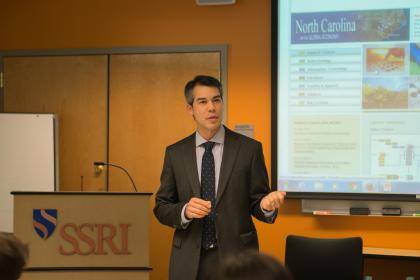The State's Changing Economy
Bass Connections students' research used by NC officials to better understand economy

Helen Wu didn't have high expectations when she enrolled in a Bass Connections class that would examine North Carolina's place in the global economy.
A second-year graduate student in East Asian Studies, Wu wasn't sure if learning about textiles and furniture would be very interesting.
She is now.
"I feel it really opened my mind and I understand more about North Carolina," said Wu, who's from China. "In this class I gained exposure to the changing IT industry, and I was able to interview people, which is invaluable. I didn't know it would be this interesting -- technology mixed with social science."
Giving students first-hand knowledge of how North Carolina's economy is connected to the rest of the world is the goal of this class, led by sociologist Gary Gereffi, who directs Duke's Center on Globalization, Governance & Competitiveness (CGGC).
Since "North Carolina in the Global Economy" started last fall, Wu and eight other students in the class have conducted significant research, not just for a grade, but to populate a revamped website for CGGC. The site provides state officials, academics and prospective businesses key information that helps them better understand the condition and trends of the North Carolina economy.
The students interviewed business leaders, policymakers and examined data from 1992-2012 to provide an interactive picture of the state's strengths and weaknesses.
"It's fantastic," Derek Chen, director of foreign operations for the N.C. Department of Commerce, said during a recent forum about the research. "I am not aware of another single site where we have that much information available for free. This is like a pot of gold sitting on the Internet."
That's another benefit of the research and the website, Gereffi said: It underscores Duke's important role in North Carolina.
The website originally was created in 2007 -- just as the global economy began to slide. This past fall, Duke launched the Bass Connections initiative to bring together faculty and students from across different fields to share expertise and find new solutions to a broad range of real-world challenges.
That fit perfectly with the research done at CGGC.

Sean Clark says the class has expanded his career considerations. Photo by BWPW Photography
In the fall semester, Gereffi's students focused on researching local and state data to update information in areas including education, workforce preparedness, where North Carolina firms and industries were located, and other information.
In the spring semester, students examined the data and heard from industry leaders such as Mike Hubbard of the National Council of Textile Organizations. This gave them a better understanding of the workforce challenges and opportunities within three high-profile segments of the state's economy: furniture, textiles and apparel, and information and communications technology.
"It's giving students a real-life experience of what it's like to be in these industries," Lukas Brun, a senior research analyst at CGGC, said during the forum.
The research has helped junior John Bowman better apply what he's learned in classrooms as an economics and environmental policy major.
"A lot of economics classes at Duke are theoretical," Bowman said. "It's helpful to apply something you use in an economics class to a practical setting and hear about the challenges the private sector is facing."
N.C.'s changing economy
The website details the trajectory of seven key industries in North Carolina -- textiles and apparel, furniture, tobacco, banking and finance, biotechnology, information technology and hog farming.
The site also provides economic data about each of the sectors and includes tables, charts and maps that help illustrate shifts over more than 20 years.
The revamped site also adds information about other states instead of only North Carolina; it's interactive instead of static; and the site includes data on state imports rather than exports alone.
Gereffi, an expert on global competiveness and value chains, said the idea for the website came to him when he was teaching about Latin America, Asia and other foreign markets about 10 years ago. "I kept thinking, 'What is the local reference?' Students would ask, 'What does this information mean for the U.S.?'"
The theme of the Bass Connections initiative was a perfect fit for the CGGC research and the need to provide the state with updated information.
The experience has expanded the career considerations of Sean Clark, a senior in the class from Canada.
"It gives you more of a qualitative than quantitative understanding," said Clark, an economics major. "I have learned that an economics major can do so many more things other than finance."